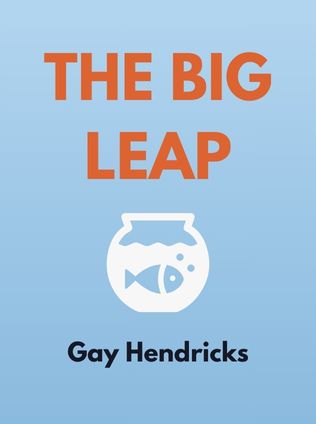
The Big Leap
Conquer Your Hidden Fear and Take Life to the Next Level
By Gay Hendricks
Published 01/2009
About the Author
Gay Hendricks is a renowned psychologist and personal growth coach with decades of experience in helping individuals achieve their highest potential. With a background in clinical psychology, Hendricks has dedicated his career to exploring the intricacies of human behavior and the psychological barriers that often prevent people from living their most fulfilling lives. His insights and methods are rooted in both scientific research and practical application, making his advice both credible and actionable. Hendricks has authored numerous books on personal development, but "The Big Leap" stands out as a cornerstone of his work, offering profound guidance on overcoming internal limitations to reach new heights of success and happiness.
Main Idea
"The Big Leap" aims to help readers identify and transcend their self-imposed limits to achieve a state of true fulfillment. Hendricks introduces the concept of the "Upper Limit Problem," which is the idea that everyone has an internal threshold for the amount of happiness and success they are comfortable experiencing. This threshold, shaped by early life experiences and ingrained false beliefs, triggers self-sabotaging behaviors whenever one nears it. The book provides a roadmap to understanding and overcoming these barriers, allowing individuals to live in their "Zone of Genius" where they can thrive and experience boundless joy, love, and success.
Table of Contents
- Introduction
- Success Propels You Toward Your Happiness Threshold
- Life Dissatisfaction May Be Caused by Hedonic Adaptation
- Levels of Success
- The False Beliefs That Hold Us Back
- Spotting Your Limiting Beliefs and Behaviors
- Limiting Behaviors in Your Relationships
- Envisioning Your State of Fulfillment
- Navigating Your State of Fulfillment
Introduction
In the introduction of "The Big Leap," Gay Hendricks sets the stage by identifying a common issue faced by many successful individuals: the feeling of being stuck or unfulfilled despite outward achievements. He explains that this feeling is due to the "Upper Limit Problem," a self-imposed barrier that limits our capacity for happiness and success. Hendricks asserts that by recognizing and overcoming this problem, we can take a significant leap into a more fulfilling and prosperous life.
Success Propels You Toward Your Happiness Threshold
Hendricks explains that as we achieve success in various areas of our lives, we inevitably approach our happiness threshold. This threshold is an internal limit set by our subconscious, beyond which we begin to feel discomfort. This discomfort often leads to self-sabotaging behaviors, such as creating conflicts in relationships or making poor financial decisions, to bring ourselves back down to a more familiar level of happiness. Hendricks describes this phenomenon through various examples:
- Individuals who excel in their careers but constantly face issues in their personal relationships.
- People who achieve financial success but find themselves making impulsive decisions that lead to losses.
He emphasizes that recognizing this pattern is the first step toward breaking free from it.
“Each of us has an inner thermostat setting that determines how much love, success, and creativity we allow ourselves to enjoy. When we exceed our inner thermostat setting, we will often do something to sabotage ourselves, causing us to drop back into the old, familiar zone where we feel secure.” - Gay Hendricks
Life Dissatisfaction May Be Caused by Hedonic Adaptation
Hendricks's concept of the happiness threshold aligns with the psychological theory of hedonic adaptation. This theory suggests that we all have a baseline level of happiness, and while positive or negative events can temporarily elevate or lower this level, we eventually return to our baseline. Hendricks argues that our baseline is influenced by early life experiences and ingrained false beliefs. To combat the effects of hedonic adaptation, he suggests strategies such as rotating pleasurable activities, savoring experiences mindfully, exploring new activities, and journaling about positive experiences.
These practices help to keep the sense of novelty and excitement alive, preventing the dulling effect of familiarity.
Sign up for FREE and get access to 1,400+ books summaries.
You May Also Like
The Subtle Art of Not Giving a F*ck
A Counterintuitive Approach to Living a Good Life
By Mark MansonRich Dad Poor Dad
What the Rich Teach Their Kids About Money - That the Poor and Middle Class Do Not!
By Robert T. KiyosakiHow To Win Friends and Influence People
The All-Time Classic Manual Of People Skills
By Dale CarnegieFreakonomics
A Rogue Economist Explores the Hidden Side of Everything
By Steven D. Levitt and Stephen J. Dubner



















